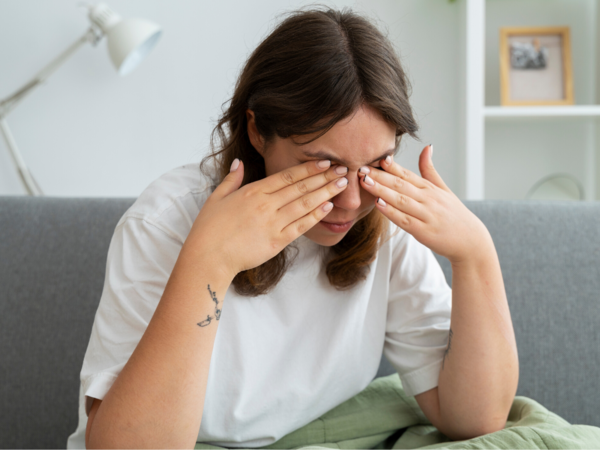With increasing age, our loved ones’ eyes do not receive the special attention they require, which can lead to blindness and vision problems. It is common knowledge that the risk of eye diseases increases significantly with age. India already suffers from serious eye problems in the population, with 7.9 crore people suffering from visual impairment and about 13.7 crore people suffering from nearsightedness. lose sight.We should shed light on how we can protect the vision of our elderly family members and help them live a healthy life.
Why does aging affect vision?
Aging affects almost every part of the body and eyes are also not untouched by it. This happens because the structure and function of the eyes are affected, increasing the risk of various eye conditions. The World Health Organization (WHO) says that most people suffering from visual impairment and blindness are above 50 years of age.
Common age-related eye problems include:
cataracts- cataracts It is a leading cause of blindness worldwide, with more than 94 million people suffering from the disease globally. In this disease the natural lens of the eye becomes cloudy, causing blurred or blurred vision. Cataract patients are unable to see properly, which affects their daily activities.
Glaucoma: About 1.12 crore people above 40 years of age in India are suffering from glaucoma. The serious issue is that glaucoma occurs only in 20 percent Patients are aware of this. This means the real number may be higher, as more than 70 percent of cases go undiagnosed. In this disease, the optic nerve gets damaged due to increased pressure in the eye. If left untreated, glaucoma can lead to irreversible blindness.

Age-related macular degeneration: Globally, 17 crore people suffer from drought age related macular degenerationOut of these 17 crore people, 4 crore people are from India. In this disease the central part of the retina is affected. This part of the retina is responsible for sharp vision, and when it changes, it becomes very difficult to read, drive or recognize faces. According to statistics, geographic atrophy, a more severe form of this disease, is one of the leading causes of legal blindness in adults over 50.
Diabetic retinopathy: More than 39 lakh people suffer from it worldwide diabetic retinopathyThis happens when diabetes damages the blood vessels in the retina, leading to vision loss and even blindness if not controlled.
recognizing symptoms early
Early detection is important to prevent serious vision loss. Family members should always pay attention to the following symptoms that indicate the onset of age-related eye conditions:
- blurred or blurred vision
- Difficulty reading or recognizing faces
- sensitivity to light
- trouble seeing at night
- halos or dark spots in vision
- Frequent changes in eyeglass prescription
7 very effective tips for eye care after age 30
If any of these symptoms are seen, the family should immediately take their elderly to an ophthalmologist.
Practical tips for eye protection and preventing vision loss
Aging cannot be stopped, but there are several steps we can take to protect our aging loved ones’ vision:
1. Regular Eye Checkup: Older people should have regular eye checkups every six months. Early detection of cataracts, glaucoma and other conditions can prevent irreversible damage.
2. Control chronic conditions: At an older age, it is necessary to manage diabetes, high blood pressure and other health conditions as these directly affect the eyes. Diabetic retinopathy and glaucoma often result from poor control of these diseases.
3. Wear Sunglasses: Senior citizens in the family should be encouraged to wear UV-protective sunglasses to protect their eyes from harmful ultraviolet rays. UV rays can cause cataracts and other eye problems.
4. Maintain a healthy diet: Eating a diet rich in leafy greens, fruits and omega-3 fatty acids is essential for proper nutrition. eye healthNutrients like vitamin C, vitamin E and zinc help protect against age-related macular degeneration in the elderly.
5. Avoid smoking: Smoking increases the risk of cataracts and macular degeneration in people over the age of 50. Elders in the family should be encouraged to quit smoking. This will reduce their risk of developing serious eye diseases.
6. Be Active: Regular physical activity improves overall health, including eye health. Exercise helps control blood pressure, reduce the risk of diabetes, and boost eye circulation. Therefore, people above 50 should exercise for at least 30 minutes daily.
7. Use corrective glasses: Family members should ensure that older adults Have the correct prescription glasses or contact lenses. Low vision aids such as magnifying glasses can also help people with advanced conditions.
8. Limit Screen Time: Spending too much time on screens puts strain on aging eyes. Therefore, older people should be encouraged to take breaks from digital devices. Family members should also ensure that lighting is in the right position to reduce stress.
9. Monitor Medications: Some medications can cause vision side effects. Therefore, it is important to review prescriptions with a doctor to make sure they are not causing or exacerbating eye problems.
10. Proper Lighting: Older adults should have well-lit environments to reduce eye strain, especially during activities like reading or sewing. Adequate lighting helps prevent unnecessary strain and promotes better visual comfort, reducing the risk of eye fatigue.
On World Elderly Day, let’s prioritize the eye health of our elderly loved ones. We can do this by taking preventive steps against age-related vision loss. We can protect their vision with timely intervention, regular checkups and paying attention to a healthy lifestyle. Recognizing symptoms early and seeking professional care are the most important things to do to ensure that their precious vision is preserved for as long as possible.
(Dr. Jai Goyal, Eye Surgeon, LASIK and Retina Specialist, and Director of Surya Eye Hospital, Mumbai)

















